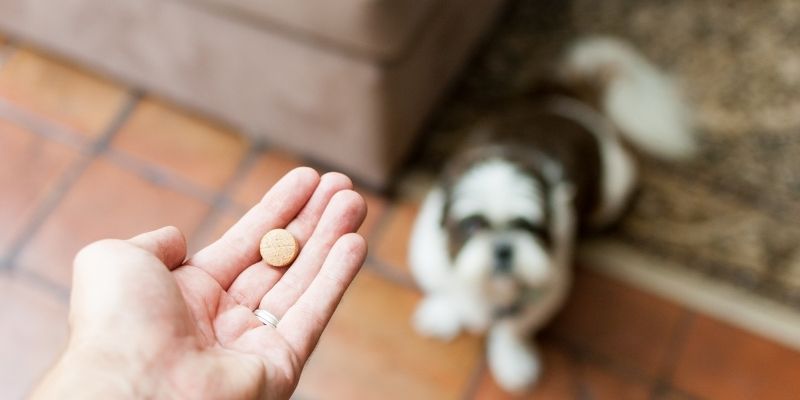Deworming is important to get rid of parasites in your pup since those can be a real threat to the dog’s health. And certain forms of parasites can be passed on to human family members.
How frequently should your dog be dewormed? All puppies should be dewormed every 2 to 4 weeks till they are 12 weeks old. After that – monthly parasite prevention has to be scheduled till they reach 6 months. And then your pup has to be treated every 1 to 6 months.
Do you have a specific question about how long it takes for worming tablets to work in dogs? Then use the table of contents below to jump to the most relevant section. And you can always go back by clicking on the black arrow in the right bottom corner of the page. Also, please note that some of the links in this article may be affiliate links. For more details, check the Disclosure section at the bottom of the page.
Here's what we'll cover:
What To expect after deworming your puppy?
The majority of deworming medications work within two to six hours of administration. Some drugs disintegrate worms, while others immobilize them.
Paralyzed worms move through the digestive tract and are excreted in your puppy’s feces. This is why, after deworming, your puppy will poop worms. This could go on for three days or perhaps longer.
To eliminate worm eggs and larvae, properly dispose of your dog’s feces. After picking up dog excrement, always thoroughly wash your hands.
Side effects of deworming your puppy
The majority of deworming treatments are completely safe for your puppy. On the other hand, your dog may encounter certain negative effects following deworming.
How long do you have to wait for dog worming treatments work?
If your dog has digested the intestinal worms medication, you should observe immediate results. The deworming procedure begins quickly, and your dog is expected to start passing worms within 2 to 6 hours of administration.
Depending on the level of the infestation and the type of worms you’re trying to treat, it could take anything from a few days to up to two weeks for your pup to be worm-free.
The first few hours after a deworming treatment
Deworming your pet at home, where they are most at ease, is a smart option. Choose a peaceful weekend if possible so your pet is calm and relaxed — not stressed or aroused by a lot of noise — and so you have time to watch your dog following the deworming treatment.
Deworming your dog is a simple process, similar to giving your pet a gift. If you use a tablet, hiding the pill in a treat such as cheese, peanut butter, turkey, or wet food can ensure that your dog thoroughly consumes the tablet. Because some pills are already flavored to taste like a treat to your pet, they may not need to be hidden in food.
Dogs may vomit quickly after taking the dose, as with any other oral drug. If your pup has a history of eating or drinking water too quickly and becoming ill, keep an eye on them for vomiting for two to three hours after the deworming tablet has been administered.
If your dog vomits the entire tablet, wait a few moments for them to settle down before re-administering the medication. Contact your veterinarian for a replacement dose if the tablet is partially digested or not visible at all. If your dog despises pills and knows all your tactics, topical deworming solutions are also available.
Regardless of the type of deworming medication you choose, the treatment will usually start working within a few hours.
Deworming process after a few days
You may or may not notice parasites in your dog’s poo in the following days after the treatment. Most deworming products paralyze and kill roundworms, hookworms, and whipworms; tapeworms are destroyed and broken up into tiny segments. Some intestinal worms, such as whipworms or hookworms, are so small that you won’t even notice them in your dog’s stool.
After deworming, it may surprise you to find live worms in your dog’s stools, but this is typical. While this may be a disturbing visual, it is actually a positive thing because it implies the worms are no longer living inside your dog! Additionally, you may notice dead worms in your dog’s feces for a few days after therapy, or your dog may have diarrhea as the dead worms breakdown. Regardless of what you notice in their stool, recently dewormed dogs act normally most of the time.
Puppies and other dogs may require follow-up deworming treatments a few weeks after the initial treatment. This is frequently determined by the type of worm and product utilized. Speak with your veterinarian if you have any queries regarding your dog’s deworming schedule.
Thanks for the blog graphics: Canva.com

Thanks for the blog graphics: Canva.com
Doghint.com is a participant of several affiliate programs. The list includes (but not limited to) the following: VigLink, Refersion, ShareASale, and Amazon Services LLC Associates Program, an affiliate advertising program designed to provide a mean for us to earn fees by linking to Amazon.com and affiliated sites. Doghint.com does not intend to provide veterinary advice. All published articles are meant for informational purposes only and not substitute the professional veterinary consultation.


